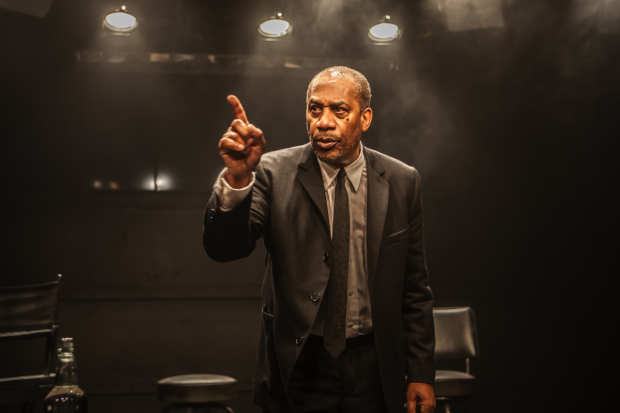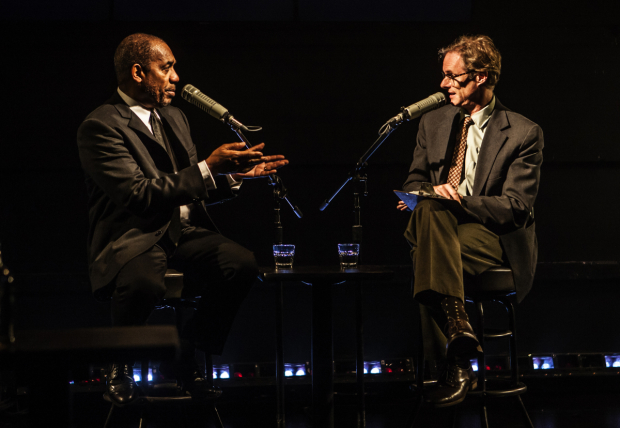Turn Me Loose

(© Monique Carboni)
An actor walks into an off-Broadway theater and tells a Polish joke. This isn't the set-up to a brilliant zinger, but the opening moment of Gretchen Law's Turn Me Loose, a bio-drama about comedian Dick Gregory starring Joe Morton (Eli Pope on Scandal). Morton gives a committed (and sweaty) performance as Gregory, convincingly embodying the stand-up in various stages of his life. This is despite a somewhat messy script that presents a grab bag of Gregory's best routines interspersed with roughly explicated highlights from his personal life. With kernels of insight hiding in mountains of superfluous fat, it feels like a promising first draft.
Of course, the subject is fascinating: A significant figure in American culture, Gregory was a frequent guest on late night TV in the 1960s and the first black comedian to really tackle race in an acerbic and sophisticated way in front of a largely white audience. He was also very involved in the civil rights movement, working with Medgar Evers and Martin Luther King Jr. Where did such bravery come from?
Law hints at an answer by presenting snippets from a lifetime of surviving violent adversity: Before he was broadcast into America's living room, Gregory played some very tough crowds in unfriendly parts of the country. A scene in which Gregory performs at a Chicago nightclub full of white southerners in town for a frozen food convention is the most dramatically compelling in the show as we watch Gregory tangle with a heckler (John Carlin). It's simultaneously hilarious and nerve-racking.

(© Monique Carboni)
Law and director John Gould Rubin do occasionally indulge in some solo show clichés, including an awkward bit of audience participation in which we are asked to stand up and yell a racial epithet at the actor. This is bound to make a large portion of an off-Broadway audience squirm, which would be an admirable thing if it were ever used for anything more than sensationalism. Morton is also made to have a bizarre shouting match with himself, an inner monologue that is performed opposite a rotary telephone.
Remarkably, Morton makes these overwrought and underexplained moments work. He's a master monologist, drawing us into his stories even when they end on a sour note, like Gregory's unsettling false epiphany that his infant son died so that he would return home and avoid assassination in Mississippi: "My son died so that I could be spared — stay alive, and to be on this planet for the sake of the Movement," he tells us with a knowing glare. This shockingly narcissistic conclusion should turn us off our protagonist, but Morton never loses the audience. It's an incredible achievement considering that for most of the show, it's just him up there.
Carlin, the other performer in the show, delivers most of his lines from the side of the stage, playing hecklers and stage managers. He's quite funny as a squeamish San Francisco journalist who conducts a very uncomfortable interview with Gregory. The scene feels very honest, and not just because the real-life Gregory practically re-created it during a promotional interview for the show.

(© Monique Carboni)
The play doesn't skirt Gregory's descent into conspiratorial madness. A later scene depicts a 2012 speech to Michigan State University in which he raves about Monsanto and the Fed. Morton changes his voice and physicality for this passage, as persuasive an older Gregory as a slick young comedian. He showers the stage with spit, manically jumping from one topic to the next. One begins to see Gregory as something of a prophet: He's the perfect comedian for our age of half-understood rage, reinforced by an avalanche of Internet garbage.
Admirably, Turn Me Loose is not a whitewash (which cannot be said about the vast majority of bio-plays and musicals concerning living subjects). Nor is it as impactful as it could be. The end result is a fuzzy portrait of a complicated figure. Law bravely reaches for an authentic truth, but tragically undermines the coherence of her play in the process.











